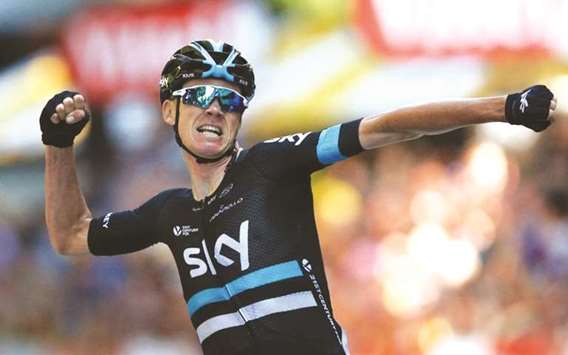Chris Froome may look far from his best and might say this year’s route does him no favours, but the Briton is the overwhelming favourite to win his fourth Tour de France crown next month.
His main rivals — an ageing Alberto Contador, a too-cautious Nairo Quintana and an unreliable Richie Porte — all seem short of the combination of ingredients needed to unsettle Froome’s Team Sky machine, and Romain Bardet looks a little green to become France’s first Tour champion since 1985.
The route will suit the most aggressive riders. Only four mountain-top finishes mean the peloton’s opportunists will look to launch long-range attacks and cause chaos — of the kind that Contador used to eliminate Froome in the 2016 Vuelta.
Team Sky’s conservative approach to the race might expose the Briton, who has not won a race this season and was bested by Porte in the time trial and the mountains during this month’s Criterium du Dauphine. “Richie has been amazing this season. I think this year’s Tour suits Richie really well,” Froome told Reuters. Porte was Froome’s lieutenant at Sky from 2012-15 before leaving for American outfit BMC to become a team leader.
The Australian, however, has a tendency to suffer bad days that can quickly become liabilities in the grand tours.
Froome might wait for the punishing stage ending up the Col d’Izoard at 2,360 metres above sea level in the final week to kill off the opposition. But he showed last year that he was able to take the initiative by attacking in descents and on the flat.
EARLY OFFENSIVE?
Two early summit finishes suggest Froome’s rivals will be on the offensive early on. The opening block of this year’s race will end with a gruelling mountain stage in the Alps with three out-of-category ascents climbed between Nantua and Chambery. Contador, 34, will be the man to watch here.
Having skipped the Giro d’Italia this season, the Spaniard has put all his eggs in the Tour basket. He has not won the Tour since 2009 and his attacks are not as sharp as they used to be, but Contador remains one of the three opponents Froome will be most wary of. “My biggest threats come from guys who did not do the Giro — Richie Porte, Alberto Contador and Romain Bardet,” said Froome.
Quintana, runner-up to the Briton in 2013 and 2015, does not rate a mention, having finished a disappointing second in the Giro.
The Colombian, who will ride in tandem with the in-form Alejandro Valverde of Spain, has tended to slip too easily into the role of play second fiddle to Froome, looking content to settle for a podium finish.
“I would love to see Quintana win but he lacks the ability to attack,” said three-time Tour champion Greg LeMond.
Other contenders include Italian Fabio Aru, Dane Jakob Fuglsang and Ireland’s Dan Martin.But should Froome be spared the repeatedly denied allegations of doping that clouded his 2013 and 2015 rides, he could end up enjoying a relatively smooth passage to Paris.
In the points classification, world champion Peter Sagan is expected to pick up a sixth straight green jersey, while France’s Thibaut Pinot will target the king of the mountains’ polka dot jersey.
Sprinters will have several chances to shine and Briton Mark Cavendish, recently recovered from the Epstein-Barr virus that causes glandular fever, will hope to add to his 30 Tour stage wins as he looks to close in on Tour legend Eddy Merckx’s all-time record of 34.
The race starts in Germany on July 1 with a 14-km (8-mile) time trial in Duesseldorf, where local rider Tony Martin will be one of the favourites to claim the first yellow jersey.
That would serve as a powerful symbol in a country that has shunned the race for many years in the wake of doping scandals and only resumed televising it in 2015.
Top security for Tour
A crack unit of elite counter-terrorism officers will be among a deployment of 23,000 police ensuring safety at the Tour de France, which begins in Dusseldorf on Saturday, the French interior ministry said. But while the jihadist terror threat is high and France remains in a state of emergency, Tour director Christian Prudhomme insists that road accidents are biggest danger to the smooth running of the Tour. “When 12 mn people line the roadside, vehicles pass, there are cyclists in front and behind, you have to be careful that enthusiasm doesn’t eliminate attentiveness,” Prudhomme told AFP. Even so, for the second year running, an elite GIGN unit — which specialises in counter-terrorism and hostage rescue — will be mobilised to tackle any potential terror threat to the three-week Tour which covers 3,500km across the country during July. The unit will be divided into two teams, one following the Tour on the road, the other by helicopter, once the world’s most prestigious cycle race enters France after two stages taking in Germany, Belgium and Luxembourg. Tour organisers ASO have “similar agreements with authorities” in those countries to ensure security, said Prudhomme, while acknowledging that “the French special forces have their own contacts with special forces in foreign countries”.
Dog teams trained in sniffing out explosives will also patrol the departure and arrival villages during each stage, the ministry added. And a special measure will likely be put in place for the Tour’s final stage finish on the world-famous Champs Elysees in Paris on July 23, where the city prefect will be able to create a “protection or security zone” that would allow authorities to restrict access to the area to individuals or groups. Last year, France was on high alert for possible terror attacks as it hosted football’s European Championships and the Tour. But while those both passed off smoothly, 86 people were killed and hundreds of others injured when a lone militant drove a lorry into crowds celebrating the French national Bastille Day holiday on the night of July 14 in Nice.

Chris Froome
